Alexander Shadrikov: ‘We have a constructive dialogue with Tatarstan industrialists’
At the final board meeting of the Ministry of Ecology of the Republic of Tatarstan, the agency and TAIF-NK JSC agreed on cooperation in matters of monitoring the state of atmospheric air
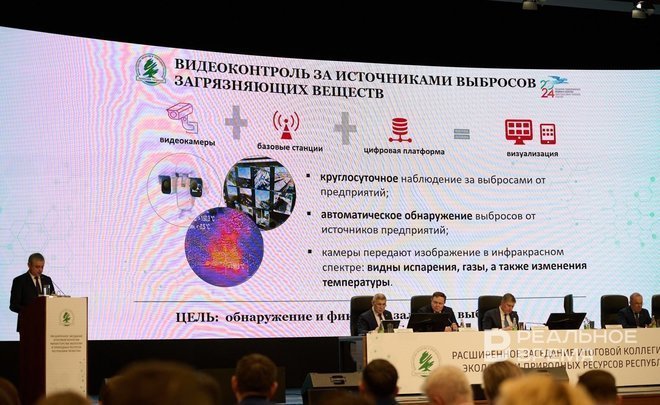
By the end of 2023, expenditures on environmental measures in the republic exceeded 10 billion rubles, of which almost 6 billion were funds from enterprises. Such figures were announced at the final board meeting of the Ministry of Ecology and Natural Resources of the republic. In his speech, the head of the department, Alexander Shadrikov, paid special attention to the issue of the state of atmospheric air. Read the details in the material of Realnoe Vremya.
4.5 times less above-limits
Minister of Ecology and Natural Resources of Tatarstan Alexander Shadrikov began the main part of his report with the quality of atmospheric air. For 30 years, the republic, with constantly growing industrial production volumes (a threefold increase in GRP in comparable prices), has managed to reduce the total amount of emissions into the atmosphere by a quarter. The control over this indicator is getting tougher from year to year.
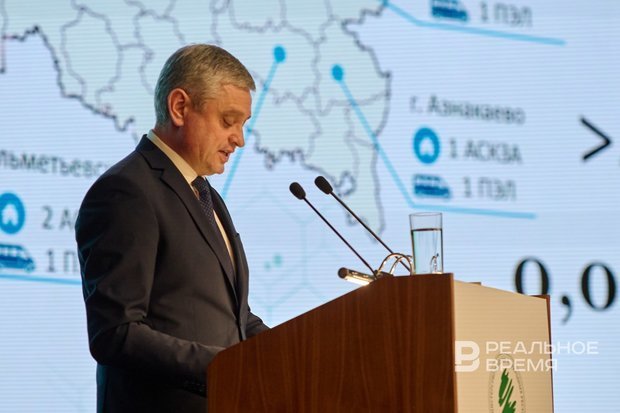
“In 2023, 4.4 million air measurements were performed in the republic. Let me remind you that automatic control stations take air every 20 seconds, averaging the indicators for 20-40 minutes. The analysis of all the data shows that in Tatarstan in 2023 the share of exceedances amounted to 21 thousandth of a percent of all measurements. Five years ago, this figure was 4.5 times higher," the minister cited the figures.
Automatic air pollution control stations are the main tool for monitoring the state of what we breathe.
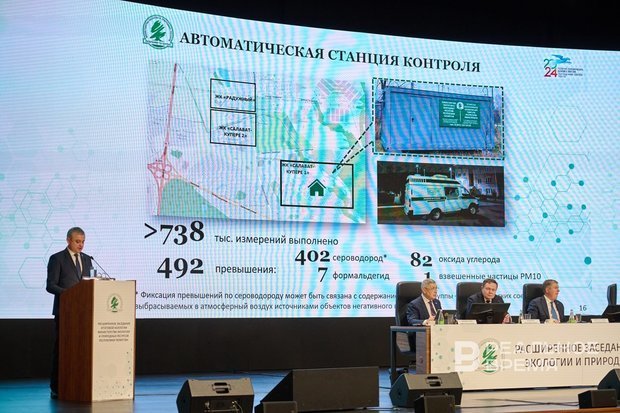
“We have 17 such stations since last year. At the suggestion of the residents of Salavat Kupere, another ASKZA has been installed. The monitoring network is complemented by nine stations of the largest enterprises of Tatarstan — Nizhnekamskneftekhim, Tatneft, TANECO. In December, the Kazanorgsintez station was launched. It will become the tenth ASKZA, which will transmit data to the general monitoring system. Now we have signed another agreement: TAIF-NK will complement our network," Alexander Shadrikov stressed and added, “Most importantly, this indicates that we, together with industrialists and nature users, are looking for and finding a constructive dialogue. Interaction is important for us. Together, we should ensure the well-being of our fellow citizens. And this is evidenced by the signed agreement.
There is going to be five stations in six months
“The agreement on cooperation between the Ministry of Ecology and Natural Resources of the Republic of Tatarstan and TAIF-NK JSC on the provision of air pollution monitoring data” is the very document signed at the board site by Alexander Shadrikov, on the one hand, and Alexey Khramov, the chief engineer of the oil refining company, on the other, and this is only a visible part of the large-scale cooperation between the department and business.
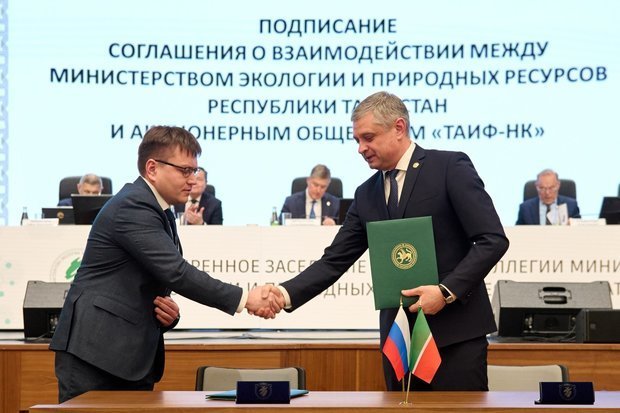
“According to the agreement, the company will install two stations for automatic continuous monitoring of ambient atmospheric air to control the emission of pollutants at its own expense. The highlight of this agreement is that it is not only a station for personal use, but these stations will broadcast information in real time immediately to the public, to the Ministry of Ecology, and to us. What it says: that we are an open organisation from the point of view of environment. The data that this station will analyse will be transmitted online to the external environment. This shows that we are confident in the environmental safety of our production facilities and are ready to transmit this data in real time," later, in a conversation with journalists, Alexey Khramov said.
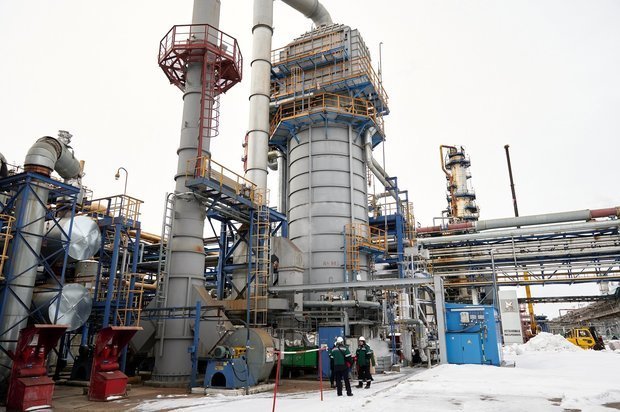
According to him, the cooperation will not be limited only to the construction of these two stations:
“There are two aspects here: the first is that legislators require the installation of atmospheric air monitoring stations at the main sources of emissions, as a rule, technological furnaces. Emissions assessment and preliminary categorisation have already been carried out at all technological furnaces, and projects have been completed. A pilot control station for monitoring pollutants at the first source, the hydrotreating complex, has been installed and successfully operates. For 2024, the company has a task: in addition to the two stations specified in the agreement, to install two more stations on our furnaces. We are doing the first work within the framework of legal requirements, the second is our voluntary undertaking within the framework of the agreement. These stations will be installed outside the fence perimeter at the border of the sanitary protection zone to monitor the state of emissions.
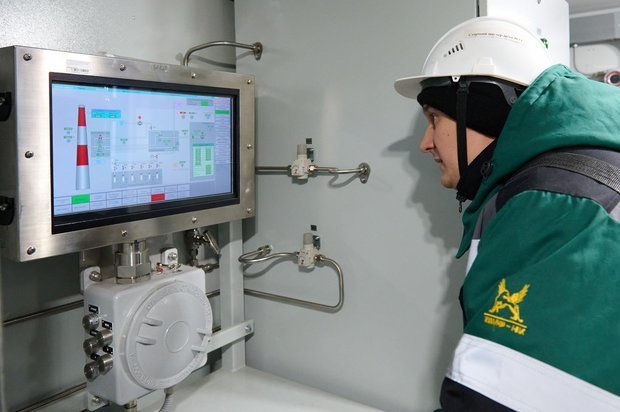
As Alexey Khramov shared in an interview, it will take a maximum of 7 months to implement the plans: one month to reach agreements with the manufacturer, it will take up to 4 months to manufacture new stations, and about another month for installation and commissioning of equipment. That is, in the summer, new facilities are to begin transmitting the first data.
“The process will be mutual: both we will transmit data, and the ministry from its sources, from its other stations, will provide information to our specialists," said the chief engineer of the company.
Half a billion rubles a year
According to statistics from the Ministry of Ecology, over the past 5 years, the number of appeals from Nizhnekamsk residents to various authorities due to the quality of atmospheric air has decreased 10 times — from the previous 583 appeals at the end of 2018, to only sixty for the whole of 2023. Over 17 years, the total emissions of Nizhnekamsk industrial complex enterprises have decreased by 35 thousand tonnes a year. Including hydrogen sulphide.
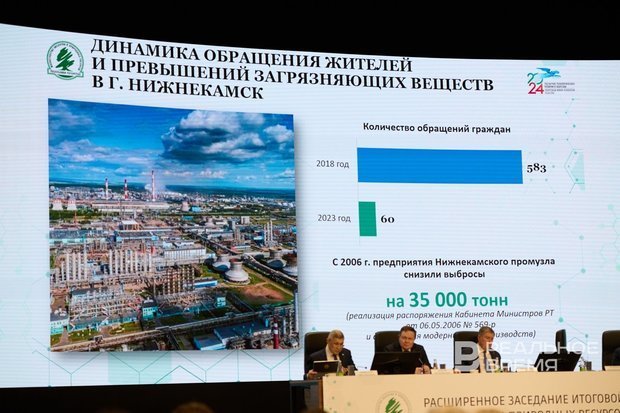
“There is also our considerable contribution to the overall results. Every year, the company allocates at least half a billion rubles for the implementation of environmental projects. This is a huge amount of money, and these investments do not decrease from year to year. If we talk about specific solutions, then since 2015 we have put unique wastewater treatment plants into operation. During this time, 12 million cubic metres of water were taken not from Kama River, but from our internal resources, purified and re-directed into production. The quality of the water that we return to the “post-treatment” at Nizhnekamskneftekhim BTF is much cleaner in terms of indicators than the water that is taken for industrial needs from the Kama River. We have reduced emissions per flare due to that this gas is now used as fuel. The company does not use liquid fuel at all. Only natural or purified refinery gas. Monitoring and control systems have also been implemented. Pontoons are installed even on those reservoirs where they were not originally provided for by the design. As for the return for the company, first of all, it is the improvement of the environment for our fellow citizens, including those people who work at our enterprises. Besides, ecology is closely intertwined with the economy: everything that, instead of becoming waste, is returned to production as raw materials, also brings an economic effect," stressed Alexey Khramov.
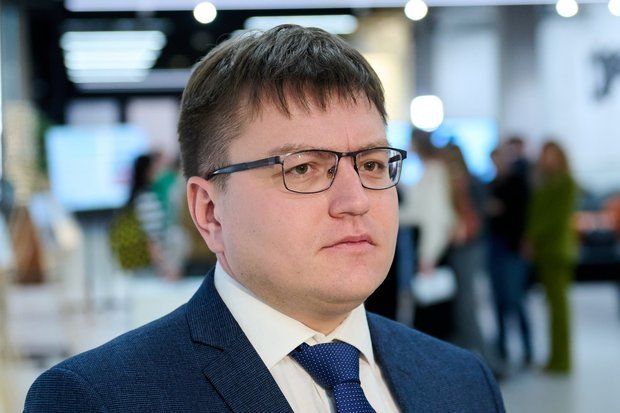
Refiners are ready to share their best practices in the field of environmental solutions. By the way, this is another point of the agreement signed with the Ministry of Ecology. The ministry is ready to take over the function of a repeater of the company's experience.